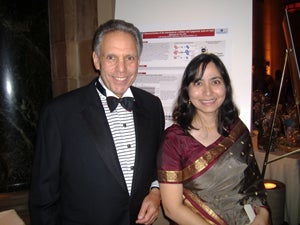Cold Spring Harbor, NY — The Roslyn, Long Island-based SASS Foundation for Medical Research has named a researcher at Cold Spring Harbor Laboratory (CSHL) a SASS Postdoctoral Fellow in Cancer Research.

The honor belongs to Shilpi Paul, Ph.D., whose work in the CSHL laboratory of Associate Professor Alea A. Mills is at the cutting-edge of cancer biology. Dr. Paul, who will receive $75,000 in 2009, will devote the award to ongoing research on a gene called CHD5, which was discovered by Dr. Mills and colleagues two years ago. Paul received her Ph.D. in the Program of Molecular and Cellular Biology in 2007 from Uniformed Services University of the Health Sciences in Bethesda, Maryland.
“Dr. Paul is performing research that is prerequisite to development of next-generation therapies for a wide variety of cancers,” says David L. Spector, Ph.D., Director of Research at CSHL. “The support that the Sass Foundation is providing is the lifeblood that enables this vital work to proceed, and the Laboratory is grateful for it.”
Martin D. Sass, Chairman and Co-Founder, said that the SASS Foundation For Medical Research, is “pleased to renew its grant to support the outstanding cancer-fighting research being conducted by Dr. Shilpi at Cold Spring Harbor Laboratory, our most prestigious medical research institution on Long Island.”
Learning about a “master switch” for cancer
The focus of Dr. Paul’s research, CHD5, is what scientists call a tumor suppressor—a protein (encoded by the CHD5 gene) that regulates a complex and extensive molecular network inside cells that acts to prevent cancer. The discovery of CHD5 as a tumor suppressor by the Mills laboratory was particularly noteworthy, as it solved a mystery that had persisted for three decades—pinpointing the region of the human genome where a tumor suppressor was located and demonstrating that this tumor suppressor was especially potent at preventing cancer.
When CHD5 is not doing its job, the machinery within our cells that normally prevents cancer is switched off. “CHD5 functions like a circuit breaker that regulates the tumor-preventing power in our cells—when it blows, cancer occurs,” Dr. Mills has explained. In collaboration with the Mills group, a team from Stanford University showed it to be involved in cancer in humans, specifically in glioma, a type of brain tumor. Evidence gathered to date supports the idea that CHD5 is responsible for a large variety of human cancers.
Dr. Paul’s work on CHD5
With help from the Sass foundation, Dr. Paul and Dr. Mills are identifying the machinery that CHD5 controls to prevent cancer. Dr. Paul’s postdoctoral work, which will now be placed on firm financial footing thanks to the Sass award, is to investigate the biochemical and cellular role of CHD5. “CHD5 has been predicted to affect how DNA within each cell of our body is packaged, but how this actually works normally and how the machinery breaks down in cancer is currently unknown. This work will provide information that will enable us to understand the mechanism whereby CHD5 protects from different types of cancer,” Dr. Paul explains.
“Too little CHD5 causes cancer, whereas too much causes extra tumor suppression”, Dr. Paul says. In fact, one extra dose, or copy, has been observed to cause cells to either stop dividing or to undergo cell suicide by switching on a battery of potent tumor protective machinery. This work indicates that pharmaceuticals which activate CHD5 may provide a way to treat many types of human cancer.
“I want to thank the Sass Foundation from the bottom of my heart for taking an interest in my work, and in backing it up with support that will move the work forward,” Dr. Paul says.
Written by: Peter Tarr, Senior Science Writer | publicaffairs@cshl.edu | 516-367-8455
The SASS Foundation for Medical Research, Inc., promotes a better understanding of cancer and blood related diseases, educates medical professionals, patients and the community-at-large on the most advanced detection procedures, therapies and treatments available. The SASS Foundation aggressively funds state of the art medical research to bring us closer to finding a cure. The SASS Foundation – A Continued Commitment to Research, Patient Care and Education.